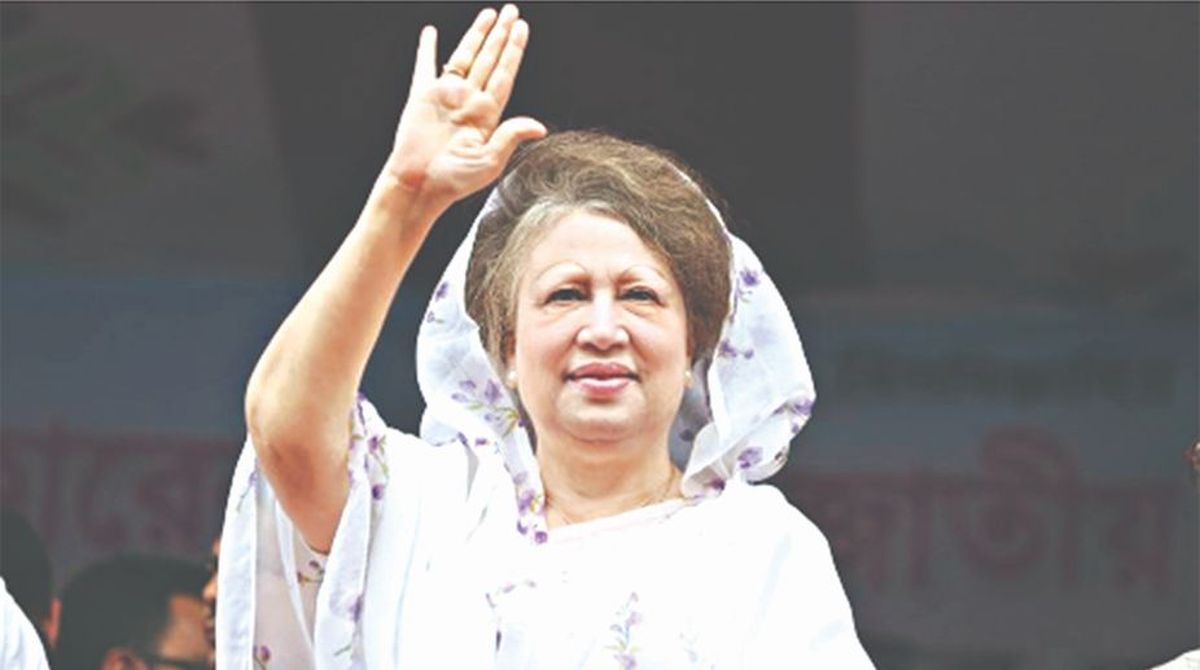Bangladeshi passenger dies in Maitree Express
A Bangladeshi passenger fell ill and died after boarding the Maitree Express on his way home.

Former Prime Minister of Bangladesh Khaleda Zia.
India demonstrated a very muscular gesture by standing alongside Bangladesh by turning back British human rights activist and lawyer Lord Carlile from Delhi airport on July 10. Carlile was engaged by Khaleda Zia to contest charges of corruption for which she is currently incarcerated in a prison in Bangladesh and being t(ried rather vigorously. Her repeated pleas for bail have been rejected by the judiciary.
India’s decision to stop Carlile from entering India enroute to Dhaka to represent Khaleda Zia is a clear signal to Bangladesh, affirming its committed friendship to Prime Minister Sheikh Hasina who has, time and again, proven herself to be a dependable ally and trusted friend by banishing scores of Indian insurgent activists and terrorists who had found shelter in Bangladesh before she came to power in 2009.
This gesture of blocking Carlile will go a long way in reinforcing the Indo-Bangla relationship. To turn away an international lawyer of repute with a high profile as a human rights activist and also as the chairman of the Commonwealth Rights initiative would require sufficient courage in the face of the expected vehement criticism by the international community, in particular the legal fraternity.
Advertisement
But it must be said to the credit of Indian establishment – comprising intelligence and security agencies plus the Ministry of External Affairs ( MEA) – that it did not baulk at defying possible criticism and extending support to Bangladesh’s Awami League in its resolve to fight the BNP and defeat the designs of rightist fundamental forces who are ceaselessly trying to corner Hasina.
This development is also a clear defeat for the BNP and its affiliates’ attempts to woo India by seeking to drum up support for Zia’s release. A BNP delegation was recently in Delhi and attempted to prevail upon the concerned quarters to legitimise BNP efforts in the build-up to the national election in Bangladesh. These efforts clearly haven’t helped.
The ruling party, the Awami League ( AL), also played its part rather diligently. It despatched a parliamentary delegation to India last month and interacted with a large number of think-tanks to create favourable public opinion. Their efforts paid dividends. It also negated the earlier BNP attempts to carve out political space in India eliciting some moral support.
In the wake of India’s firm stand in refusing entry to Carlile, the MEA was rather quick to clarify that his intended activity in India was incompatible with the purpose of the visit as stated in his visa application. Under the circumstances, he was denied entry into India upon arrival.
The denial thus forestalled any plans Carlile might have had to meet Indians who could have supportive of Khaleda Zia or by implication, opposed to AL in general and Hasina in particular.
Carlile, besides being a human rights activist and an international lawyer of renown, has been opposing tooth and nail the Bangladesh government’s efforts to try war criminals responsible for killing thousands of minority community and pro-liberation forces who were fighting for the independence of Bangladesh in 1970-71. The public opinion in Bangladesh is largely why the BNP should engage a lawyer who supported the war criminals.
Now that India has stood by Bangladesh and displayed it in substantial measure by turning away Khaleda’s British lawyer, it would seem imperative for New Delhi to consolidate this diplomatic triumph and further cement ties with Bangladesh.
As of today, Bangladesh is the only neighbour which is India’s friend and is always ready to lend help. Very recently, Prime Minister Hasina’s special envoy, HT Imam was in Delhi conveying a message for more harmony and friendship between the two countries. According to him, sharing of Teesta waters, which remains an irritant, would not be allowed to become an election issue.
India should invest its energy and diplomacy to see that Hasina remains in power. In case this opportunity is missed, pro-Pakistan and fundamentalist forces will gain an upper by dislodging Hasina and once again encourage anti-India elements to find sanctuary on Bangladeshi soil.
It is also then likely to see renewed excesses on the Hindu minority in terms of grabbing their property, forced conversions and desecration of places of worship. As of now, the going is good between the two countries and such a trend deserves further consolidation.
The writer is a security analyst, Bangladesh watcher and former National Security Adviser in Mauritius. The views are personal.
Advertisement